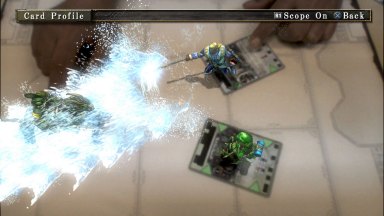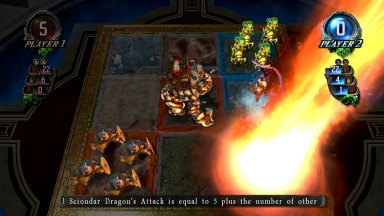| |
 The
Eye of Judgment (Playstation 3) The
Eye of Judgment (Playstation 3)
The Eye of Judgment is an innovative and interesting attempt to meld card
and video games using the console's unique Playstation Eye camera. The
basic gameplay consists of battles where players place creature and spell
cards on a grid, which then provoke battles. The premise is simple first
player to capture five of the grid's 9 squares wins. Players have to watch
their manna and summoning energy before they use all their cards while
making sure their opponent's don't gain the upper hand. Eye of Judgment
features single-player, versus and online modes to help you compete
against friends. The Eye of Judgment is fairly interesting from a
technical standpoint, but the question is whether its gameplay stand up
after the flashy special effects wear off.
|
The
Eye of Judgment is an interesting hybrid of turn-based card role-playing
and video games that succeeds at bringing this genre to a new level of
interactivity thanks to its innovative use of the Playstation Eye camera.
The gameplay itself is fairly straightforward. You begin by pulling five
cards out of a deck and placing them on a grid. On each card, players will
find several different numbers that represent that card's abilities and
strengths. There are three types of card - creature cards, which are used
to summon different creatures on the battlefield - magic cards where you
can engage a spell to place on a square and action cards where you can
perform basic actions. The grid is divided into nine squares, each of
which represents a different type of element. In order to summon a
creature, you need to have enough manna points in your section, otherwise,
you have to hold that card until your next turn. You gain additional manna
points for every square you occupy at the end of each round.
 The gameplay
is fairly simple and each match can be finished relatively quickly if you
want them to. Eye of Judgment's rules are easy to understand for the most
part, and a helpful online tutorial should get you up to speed on the
basics fairly quickly. Depending on which creature you use, you can then
attack an opponent's creatures if they're occupying an adjoining square.
The directions you can attack are based on which direction the creatures
on the card are facing. Playing against the computer AI is a good way to
practice and it can offer a surprisingly good game at the higher
difficulty levels. The game's key strategy is to keep your best cards in
your deck until you can attack an opponent's weaker forces. You also need
to know when to use your spell cards and not waste them early on unless
you get into trouble. One of the most exciting aspects of Eye of Judgment
is its unpredictability - the whole momentum of the game can change on the
turn of a single card, and its this aspect of the game that makes playing
it so engrossing. The first player to control 5 of the nine squares wins,
but you can also lose if you run out of cards or you exceed the timer
three times during the game. This makes things a lot more challenging than
they sound, since the limited number of cards reduces your margin for
error. Keeping track of your manna points and knowing when to use cards is
another challenge you need to face. The gameplay
is fairly simple and each match can be finished relatively quickly if you
want them to. Eye of Judgment's rules are easy to understand for the most
part, and a helpful online tutorial should get you up to speed on the
basics fairly quickly. Depending on which creature you use, you can then
attack an opponent's creatures if they're occupying an adjoining square.
The directions you can attack are based on which direction the creatures
on the card are facing. Playing against the computer AI is a good way to
practice and it can offer a surprisingly good game at the higher
difficulty levels. The game's key strategy is to keep your best cards in
your deck until you can attack an opponent's weaker forces. You also need
to know when to use your spell cards and not waste them early on unless
you get into trouble. One of the most exciting aspects of Eye of Judgment
is its unpredictability - the whole momentum of the game can change on the
turn of a single card, and its this aspect of the game that makes playing
it so engrossing. The first player to control 5 of the nine squares wins,
but you can also lose if you run out of cards or you exceed the timer
three times during the game. This makes things a lot more challenging than
they sound, since the limited number of cards reduces your margin for
error. Keeping track of your manna points and knowing when to use cards is
another challenge you need to face.
While the basics are easy to understand,
EOJ's turn-based system is fairly elaborate for this type of game. Each
square represents a different element such as fire or water that affects
the creatures you summon. You also have to watch their innate abilities
and styles, and they can lose to a stronger opponent if you aren't
careful. Learning when to use the special spell cards is kind of tricky as
well, and the game's timer pressures you into making decisions quickly.
This makes for some fairly solid play mechanics, and these represents your
core play actions. On the surface, playing The Eye of Judgment isn't that
different from many other card games on the market, you are dealt a hand
of cards from a main deck and engage in battles against either a human or
AI opponent on a game board. However, what differentiates this from these
game is the use of the Playstation Eye camera (included in the main set)
that reads each card and displays an on-screen animation whenever you
engage in battle. These animations can be either elaborate battle
sequences or quick special moves. They help to bring the action of the
card-game to life effectively and lets you see the creatures you summon
brought to life. For the most part, this system works well, since the
camera reads effectively and can be set up to be unobtrusive to the
action. Unlike many other attempts to bring this style of game to
consoles, here the effect is far more integrated and gives you both the
tactile sensation of handling actual cards along with the visual flourish
of a video game. It's an excellent concept that's been executed fairly
effectively from a technical standpoint and uses the new Eye Camera
technology in a clever and innovative way.
 Setting
up the Eye of Judgment's accessories is fairly simple, you place the mat
on a flat surface, then connect and place the camera and its stand in one
of four corners, then deal the cards. We had little trouble getting the
cards to read even in a somewhat dimly lit room, and this process works
remarkably well and consistently once you get the hang of it. Most of the
time, you place the cards on the mat, but the spell and action cards need
to be held up to the camera, which is a cool feature. This makes for a
game that's fairly easy to use and play - and isn't nearly as complicated
as you'd think. You can use the cards almost exclusively during gameplay
while the standard PS controller is used to control menu options. This
accessible approach means you can set up and break down the game fairly
easily and get right into the action. The Eye of Judgment's mix of
standard card game mechanics and video games blends well thanks to its
visuals, which are quite impressive. When you place a card on the board
and its read, a quick animation shows the creature or item you've summoned
come to life. This a very cool effect and brings the otherwise static
action to life in a vivid and convincing fashion unlike anything seen in a
video card game to date. The elaborate battle animations resemble those
you see in a traditional RPG which helps to make things even more
interesting. This slick, technically impressive approach is the main thing
in the game - and its character designs are cool as well. The included
card set and booster pack make a good starting point, but players can also
purchase additional packs later on if they want to. The Eye of Judgment is
an entertaining and challenging title that offers an innovative and
challenging card game mixed with some cool video game style effects. It
probably won't appeal to all gamers, since its niche-style play is drawn
from the card genre, but its an impressive piece of technology with an
entertaining game underneath that makes it more than just a flashy gimmick
without substance. Setting
up the Eye of Judgment's accessories is fairly simple, you place the mat
on a flat surface, then connect and place the camera and its stand in one
of four corners, then deal the cards. We had little trouble getting the
cards to read even in a somewhat dimly lit room, and this process works
remarkably well and consistently once you get the hang of it. Most of the
time, you place the cards on the mat, but the spell and action cards need
to be held up to the camera, which is a cool feature. This makes for a
game that's fairly easy to use and play - and isn't nearly as complicated
as you'd think. You can use the cards almost exclusively during gameplay
while the standard PS controller is used to control menu options. This
accessible approach means you can set up and break down the game fairly
easily and get right into the action. The Eye of Judgment's mix of
standard card game mechanics and video games blends well thanks to its
visuals, which are quite impressive. When you place a card on the board
and its read, a quick animation shows the creature or item you've summoned
come to life. This a very cool effect and brings the otherwise static
action to life in a vivid and convincing fashion unlike anything seen in a
video card game to date. The elaborate battle animations resemble those
you see in a traditional RPG which helps to make things even more
interesting. This slick, technically impressive approach is the main thing
in the game - and its character designs are cool as well. The included
card set and booster pack make a good starting point, but players can also
purchase additional packs later on if they want to. The Eye of Judgment is
an entertaining and challenging title that offers an innovative and
challenging card game mixed with some cool video game style effects. It
probably won't appeal to all gamers, since its niche-style play is drawn
from the card genre, but its an impressive piece of technology with an
entertaining game underneath that makes it more than just a flashy gimmick
without substance.
- Michael Palisano
Grade:
B
|
| |
|

